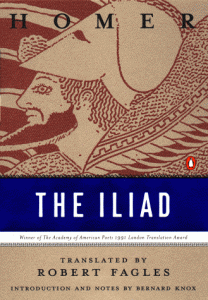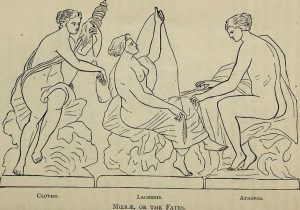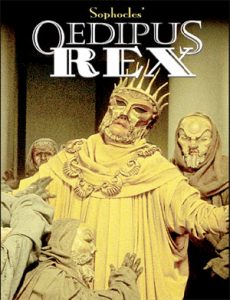Classical Greek and Roman mythology as a religious following has brought to light many of the virtues that are important to the culture of that time period. The idea of predetermined fate has been brought up numerous times through extensive story telling. Specifically, this topic is expressed through the tales of Zeus and the two jars, the story of the Fates, and the story of Oedipus. Each of these brings to light different ideas of fates and explanation to the world of the unknown that surrounded the Greek and Roman people.
The epic poem The Iliad, written by Homer, recounts the events of the Trojan War. This piece of literature was written around 800 B.C. and was written to document the story telling of that era. Within this book, Homer is quoted in writing of Zeus’s action of giving each mortal a handful of evils and a handful of blessings. This is represented by two jars that sit beside the god. Each handful is given out from the corresponding jar and they determine how fortunate one will be.
corresponding jar and they determine how fortunate one will be.
This representation of fate seems to play into the idea that everyone is given good and bad fortune. Later, Homer specifically addresses a man named Peleus. It is stated that he was blessed with gifts starting right at birth until he died (Homer, 800B.C.). He was even given a goddess as a wife. This man, however was still given some evil. His only son was destined to die early.
The Greeks could have also used this story as an explanation for why things occur that are out of the control of humans. We are not able to alter each situation as we please and, often times, those type of situations happen without full enlightenment of why. This idea of evils and fortunes given by a god help the Greek people solidify the unknown reasons for good or bad luck.
The story of the Fates brings a different outlook to the idea of predetermined outcomes. This story can be found within the Dictionary of Classical Mythology by Jenny March. This dictionary was published in 2014 and was written to inform the readers of the characters and stories of classical mythology.
March writes briefly about the Fates (also known as the Moirai) and each one of their roles. The fates consisted of three goddesses known as Clotho, Lachesis and Atropos. Each played a specific role in their ultimate goal of writing out each mortal’s fate. In this story, a mortal’s life was like a thread of yarn. Clotho, whose name meant spinner, spun the yarn of life. Lachesis, whose name meant apportioner, gave the correct length for the yarn. Finally, Atropos, whose name meant inflexible, cut the yarn, essentially symbolizing the end of the mortal’s life.
This myth specifically illustrates the power of fate. March states, “Even the gods, it seems, were subject to the decrees of the Fates” (March, 2014). This shows the strong Greek and Roman view that fate cannot be altered by any means. Every mortal is destined to die and not even a god cannot change that.
It is also important to recognize that often times these goddesses are not always discussed specifically within the storytelling. As March put it, they “only played an occasional part in mythological events” (March, 2014). This is significant because they don’t need to be mentioned. Everything that happens to a mortal is assumed to have been written out already by the Fates. This, then, becomes a perfect metaphor for predetermined life. Just as the Fates don’t need to be mentioned, neither do reasons for events in life. These events are the direct cause of the Fates and that provided enough explanation for the people of this time.
Oedipus is a story of an attempt to avoid fate. This is told through many plays, but maybe most famously told by Sophocles in a play titled Oedipus Rex. This was written and performed around 400BC. This form of storytelling was most likely written as a form of entertainment for the Greek and Roman people.
This plot of this story discusses how Oedipus was destined to kill his father and marry his mother. He was sent away from his parents at a young age to prevent this. Oedipus grows up with new parents, who he believes to be his blood. Once he is older, he hears of the prophecy and runs away to avoid hurting his new family. On his journey, he fights and kills a man. He then, later, marries a queen making him king. The new King Oedipus soon finds out that the man he had murdered was the former king and that his queen wife is his mother.
This story addresses the inability of any mere mortal to avoid fate. His family attempted to save themselves, but failed. He attempted to save his family, but failed. The play addresses the point that Oedipus, and his parents, knew his destiny, but still fell into it. As Oedipus’s parents were attempting to save themselves, they were contributing to the series of events that lead to what they feared most. Similar to when Oedipus attempted to save his new family. He fell into the route that was already decided for him. Essentially, his fate was inevitable.
Each of these stories brings to light a different aspect of fate that helped to shape the lessons and beliefs that the Greeks and Romans of this time were attempting to report. The story of Zeus brings to light that everyone has good and bad luck. There is no one that is born completely free of one. The story of the fates describes the power of fate. It tells us that every mortal will die and no god can save us. Finally, the story of Oedipus describes our inability to run from fate. These, ultimately, form one large lesson from this time period that fate is inevitable and predetermined.
Bibliography
Anon, (2017). [online] Available at: https://records.viu.ca/~johnstoi/homer/iliad24.htm [Accessed 30 Jun. 2017].
Archives.dailynews.lk. (2017). Features | Online edition of Daily News – Lakehouse Newspapers. [online] Available at: http://archives.dailynews.lk/2012/01/12/fea17.asp [Accessed 30 Jun. 2017].
Biography.com. (2017). Homer. [online] Available at: https://www.biography.com/people/homer-9342775 [Accessed 30 Jun. 2017].
Cliffsnotes.com. (2017). Oedipus the King. [online] Available at: https://www.cliffsnotes.com/literature/o/the-oedipus-trilogy/play-summary/oedipus-the-king [Accessed 30 Jun. 2017].
March, J. (n.d.). Dictionary of classical mythology.
Martintcahill, V. (2017). If Books Were Beer: The Iliad & The Odyssey. [online] Martin Cahill. Available at: https://martintcahill.wordpress.com/2013/06/27/if-books-were-beer-the-iliad-the-odyssey/ [Accessed 30 Jun. 2017].
ThoughtCo. (2017). The Three Moirai: Clotho, Lachesis, Atropos. [online] Available at: https://www.thoughtco.com/moira-goddess-of-fate-119859 [Accessed 30 Jun. 2017].